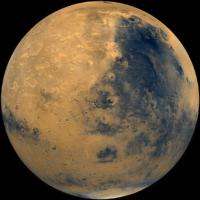Obama aims to send astronauts to Mars orbit in 2030s

President Barack Obama set a bold new course for the future of US space travel when he announced plans to send US astronauts into the orbit of Mars within the next three decades.
The US leader on Thursday also sought to quell a storm of outrage caused by earlier administration plans, vowing before NASA staff that he was "100 percent committed" to their mission and to the future of the US space agency.
"I believe that space exploration is not a luxury, it's not an afterthought in America's quest for a brighter future. It is an essential part of that quest," he told a crowd at the Kennedy Space Center in Florida.
Obama made a whirlwind trip after stinging criticism of his decision to end the costly Constellation program, a project to return US astronauts to the moon.
Obama -- accompanied by astronaut Buzz Aldrin, the second man to set foot on the moon after Neil Armstrong in 1969 -- said his administration would pump six billion more dollars into the NASA budget over the next five years.
He also had specific ideas how it should be spent.
"We should attempt a return to the surface of the moon first, as previously planned. But I just have to say, pretty bluntly here, we've been there before. Buzz has been there," Obama said.
"There's a lot more of space to explore and a lot more to learn when we do," he said, to loud applause.
"By 2025 we expect new spacecraft designed for long journeys to allow us to begin the first ever crew missions beyond the moon into deep space.
"So, we'll start by sending astronauts to an asteroid for the first time in history. By the mid-2030s, I believe we can send humans to orbit Mars and return them safely to earth, and a landing on Mars will follow."
In a nod to critics who say the new approach will costs jobs, Obama said he was retaining the Orion capsule segment of the Constellation project.
Obama said he had instructed NASA administrator Charles Bolden to design a rescue vehicle using technology already developed for the Orion capsule.
The United States would also invest some three billion dollars in research on a heavy-lift rocket to send crew capsules and supplies into deep space, with the design to be finalized by 2015.
Obama said his plan includes increasing "robotic exploration of the solar system, including a probe of the sun's atmosphere, new scouting missions to Mars and other destinations, and an advanced telescope to follow Hubble."
Obama also pledged the new plan would create some 2,500 jobs along Florida's so-called space coast in the next two years -- aiming to bring new hope to a region blighted by high unemployment.
Critics, including the first man on the moon Neil Armstrong, were upset by Obama's decision earlier this year to scrap the bloated and behind-schedule Constellation program.
The aging US space shuttle fleet, which carries astronauts to the International Space Station, is due to be grounded at the end of the year, leaving US astronauts to hitch rides on Russian spacecraft to orbiting station until a replacement is developed.
"Without the skill and experience that actual spacecraft operation provides, the USA is far too likely to be on a long downhill slide to mediocrity," Armstrong, 79, wrote in a letter co-signed by two other astronauts.
After the speech, leading Republicans went on the attack.
Senator Kay Bailey Hutchison of Texas said Obama's vision for NASA "continues to leave America grounded," and complained that without a shuttle, US space flight options will depend on countries like Russia and China.
The plan "fails to guarantee American leadership in space and the American people and Congress will not settle for it," added Senator John Cornyn, also from Texas.
"President Kennedy opened the door to the new frontier," said another critic, Republican Congressman Rob Bishop, "but Obama has slammed it shut and thrown away the key." Bishop represents a district in the western state of Utah where part of Constellation's Ares I rocket was being made.
Obama however anticipated his critics. "We will actually reach space faster and more often under this new plan in ways that will help us improve our technological capacity and lower our costs," he said.
"Nobody is more committed to manned space flight, to human exploration of space, than I am. But we've got to do it in a smart way."
Some 1.9 billion dollars in Obama's plan would be dedicated to upgrading the Kennedy Space Center, which would also be in charge of NASA's commercial rocket venture.
(c) 2010 AFP




















